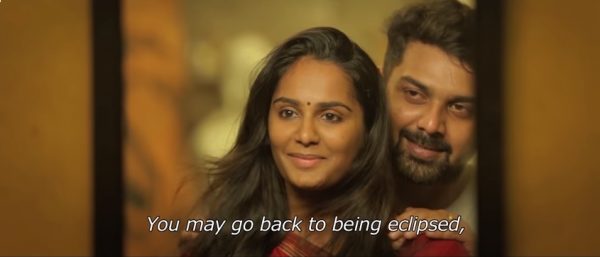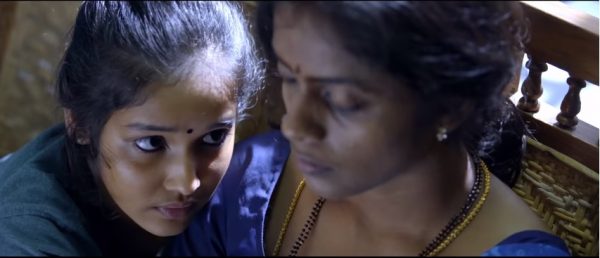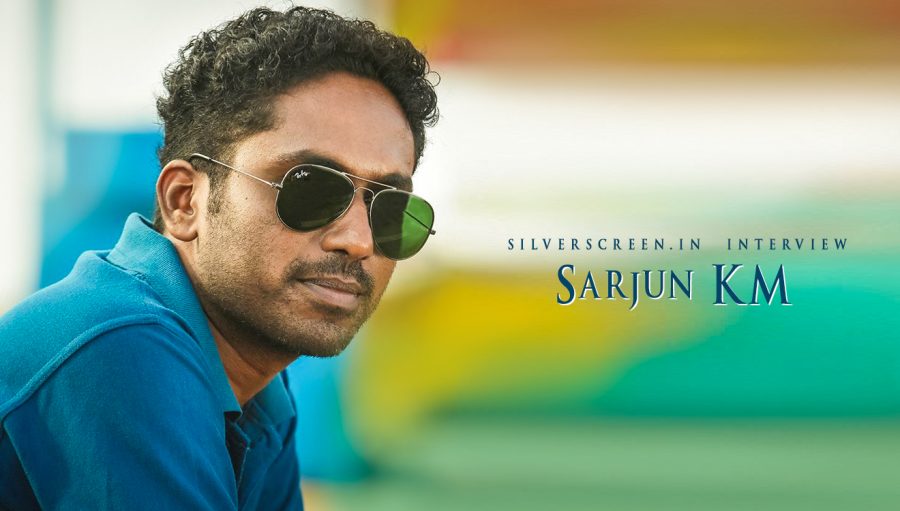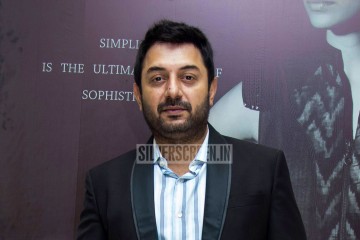KM Sarjun, the 31-year-old director whose short films stirred debate and evoked strong emotions among the audience, says he doesn’t want to be labelled as a filmmaker who deals with social issues. He is now consciously trying to move away from ‘women-oriented films’; his first full-length feature, Echcharikkai Idhu Manidhargal Nadamadum Idam, is a horror drama.
Sarjun KM’s debut feature film is yet to reach the theatres, but the young filmmaker is already a star in his own right. He shot to fame last year with a short film, Lakshmi, that earned bouquets well as brickbats for its undeniably sublime portrayal of an extra-marital relationship. Three months later, he made yet another hard-hitting short film, Maa, set in a lower middle-class household where the only daughter, a 15-year-old girl, gets accidentally pregnant. Both the films are centered around female protagonists who quietly rebel against societal norms. The films have clocked several millions of views on YouTube, and the comments’ section is a mixed bag of views on morality and gender politics.
Life hasn’t been the same for Sarjun ever since. Last week, it was announced that his first feature film, Echarikai Idhu Manithargal Nadamadum Idam (Beware Of Humans), which was lying in the cans for over six months now, is all set for a theatrical release. The film stars Sathyaraj and Varalakshmi Sarathkumar in the lead roles. Also, his second feature project is already in the pipeline. The film, a horror-drama produced by Kotapadi J Rajesh of KJR Studios, has actor Nayanthara playing the lead.
In a conversation with Silverscreen.in, the young director opens up about his short films, his new-found fame, and the kind of cinema he wants to make.
*****
While Amazon and Netflix are brewing a revolution in the world of small-screen content in India, a large number of young, amateur short filmmakers from south India continue to be fixated with themes such as teenage infatuation, romance, and heartbreaks. It is to this mushy world that Sarjun KM forayed with themes such as an extramarital affair and teenage pregnancy.
“Honestly, I have done those things too,” he laughs. “I have done a music video, I have done romantic short films.. But I was in a different place then.”

“When I set out to do Lakshmi, I decided that if I were to make a short film, it should be something substantial that would prompt people to watch it. What is the point otherwise,” Sarjun says. “When you start making mainstream feature films, you could get stuck with romance and heartbreak forever. It’s a cliche mainstream hardly gets tired of. Short film is where you can do the stuff you really want to do. There is no censor, there is no restriction. You can experiment, make mistakes, release it wherever you want… Why should I waste such an opportunity?”
Sarjun then adds that he will never stop making short films. “I want to continue to make short films once in a while, in between feature films. That is where you can truly be honest to yourself.”
Although he’d always wanted to be a filmmaker, Sarjun chose to study cinematography at Mindscreen Film Institute in Chennai. “I wanted to learn the technical side of cinema at a proper school,” he says. After film school, he went on to assist filmmaker Mani Ratnam in a period project called Ponniyin Selvan which got shelved. Further, he worked as an assistant director to Mani Ratnam in Kadal. The project went on for two long years after which Sarjun teamed up with AR Murugadoss for Kaththi. Later, he returned to Mani Ratnam’s production company to assist him in the post-production part of OK Kanmani.
To sum it up, Sarjun managed to get a comprehensive understanding of filmmaking. “Nothing was planned. I just grabbed the opportunities as they came,” he says. He made Lakshmi a year ago, when he had some time in hand. He wrote a script, made it into a film, and sent it to film festivals. “I wasn’t planning to release it on YouTube, let alone expect it to go viral and become controversial,” he says. After the film had finished its festival tour, he heard that Ondraga Entertainment, the home banner of Gautham Vasudev Menon, was looking for YouTube content. “I approached them, and they loved Lakshmi. That’s how it landed on YouTube,” he says.
The controversy surrounding Lakshmi was a little too much to take for Sarjun. “I stopped checking comments after a point of time,” he says.
“Lakshmi wasn’t a film on love or romance, it was more about the human need to look for attention. She was being taken for granted, treated insensitively by the person she was living with,” he says. “I didn’t play safe at all. I hadn’t even thought of releasing Lakshmi on Youtube. Before Lakshmi, I had done two short films, out of which one touched around 10,000 views on Youtube; I don’t think anyone watched the second film,” he says. “If you ask about Maa, I will say I played it safe,” he adds. “I had pitched two concepts to Gautham sir. He liked the second story that I narrated, which became Maa. I was skeptical about the plot. Honestly, I didn’t want to get into a controversy. I actually asked him if we should really do it. He asked me not to worry. ‘We will not get into Lakshmi zone,’ he said.”

Several comments on YouTube about Maa fume that the film is ‘pro-abortion’, but Sarjun doesn’t agree with the opinion.
“I don’t see Maa as a pro-abortion movie. It’s just a one-off case, about a particular character, narrated from the perspective of her mother. If the incident – an out-of-wedlock pregnancy – happens to a 24-year-old girl who lives in better circumstances, they could probably work out another way. I believe one shouldn’t bring a new life into this world when you are in a state of fear or insecurity,” he says.
*****
Sarjun’s films have a tone radically different from that of the films of Mani Ratnam, his mentor, and Gautam Menon, with whom he collaborated for Maa. Where do you belong, I ask him. “It’s true that my films are more rooted in local spaces than what Mani sir or Gautham sir does. I grew up in Triplicane, one of the oldest parts of Chennai. It is very crowded, has a bustling heterogeneous population, like Hyderabad old city. A lot of my experiences come from that place.”
City plays an important character in both the short films; they unfold in crammed spaces. “Lakshmi and Maa are set in middle-class houses that resemble mine, on streets similar to where I live. There, you would always run into your friends, relatives or neighbors from whom keeping a secret very difficult. You can’t even talk loud; people would come running wanting to know if everything is okay,” he says.
Through the two films, he also attempts to discuss gender politics within our middle-class households. “No matter how much mankind has progressed, we still face the problem of gender imbalance. This is particularly more relevant within a family,” he says. “Men don’t understand women, and women don’t understand men. However, I would say the former problem outweighs the latter.”
“One of my inspirations for portraying powerful women is Mani sir who always ensures that his women characters are as strong as the male protagonist. Even otherwise, I grew up watching strong women. My mother, a teacher, is one. Also, to be very frank, both good and bad experiences in my life were caused by women,” he says. But Sarjun doesn’t want to be labelled as an off-beat filmmaker who makes only issue-based films. “I will probably take a break from women-oriented films now,” he says.
*****
Echirikkai is a crime drama. It revolves around a kidnap, and a 60-year-old cop who gets involved in the case. “It’s an emotional film, not exactly a suspense thriller,” says Sarjun. “I chose Sathyaraj because I wanted someone very charismatic; old yet powerful. When I approached him, he loved the script. He became more curious and excited when I showed him some references. I told him in advance that even though he is a cop in the film, he won’t be wearing a police uniform in any scene. It’s not a typical mass police role.”
But that doesn’t mean Sarjun is averse to mainstream ‘mass’ films.”In fact, I love mainstream entertainers. I would like to make a good mainstream film, probably with a superstar,” he tells me. Working with Murugadoss in Kaththi – a mega-budget film done on a huge canvas – was a remarkable experience for him. It was fascinating to see him [AR Murugadoss] managing such a big set smoothly, without losing grip on filmmaking, says Sarjun.
“I accept that not everything is smooth. There is a superstar culture and fan frenzy which is growing out of hands, but there are also really sensible producers who want to make extraordinary films. There is a balance. I am okay with the way the industry is functioning. I think I can make things work, no matter how chaotic it might seem,” he says.
Sarjun is confident that he won’t fall into the traps that young directors with a background in short filmmaking generally succumb to.
“When you venture out to make a feature film straight from the success of your short film, it is possible for you to mess things up. Thanks to digital medium, it has become easier to make a short film. Most of the short filmmakers spend money from their own pocket. It is a simple process compared to what mainstream feature filmmaking is. There are a lot of restrictions and responsibilities when you are spending someone else’ money,” he says. “I have seen how mainstream films gets made right from pre-production stage till the release. One of the most important lessons I learned from Mani Ratnam is that shooting in a stipulated period is very important. He does films with stars, he does big films, but he always keeps them within a budget, finishes shoot within the scheduled time. He keeps a bound script ready much ahead of the shoot, and does pre-production meticulously. ‘You need to be a business man to be a good filmmaker,’ he would say.”
Recommended
Kotapadi J Rajesh of KJR Studios, the producer of Aramm, is bankrolling Sarjun’s second feature film which is a horror-drama. “After Maa was released, I got a call from Rajesh sir who asked me if I had a one-liner for Nayanthara. He added that they preferred a horror drama. He heard the story I had in mind, and then made me sit with Nayanthara who liked it too. In fact, she had liked ‘Maa’ a lot.”
Horror drama seems to be Kollywood’s favourite genre, I say. “True,” declares Sarjun, “Several horror dramas release a year, but except a few like Pisaasu and Aval, there aren’t many memorable films. If a particular theme or idea succeeds, people tend to repeat that a lot in the film industry, and things start getting very bland and monotonous. But, someone is sure to break that spell.”
*****
The KM Sarjun interview is a Silverscreen exclusive.



